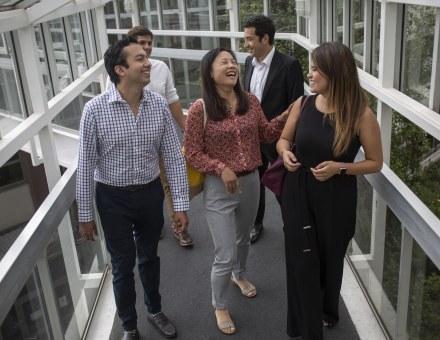From October 2021 to March 2022, five emlyon business school International MBA students put their heads together to devise a virtual solution to a concrete challenge – the increasing disparity between the private and state education systems in India. Run by the esteemed, Project Management Institute accreditation organization, the “PMI Make Reality Challenge” saw the emlyon team finish in second place from no fewer than 5,800 initial entrants. Three team members recount their six-month journey.
“India is one of the developing countries where there is a chasm between quality education for the rich…and the rest,” begins IMBA student Neeti Srivastava. “The gap is widening to the extent that even the lower-middle class is being priced-out of the market so there is an urgent need to find solutions to this growing problem for all strata of Indian society, starting with the quality of teaching and access to quality teaching.” The perfect gauntlet was thrown down to Neeti and her classmates Smriti Khemani, Haobo Jiang, Ana Mordynskaja, Smriti Khemani, and Linnan Fan in the form of the PMI Make Reality Challenge. This global event invites participating teams to work over a six-month period (for those that reach the Grand Finale) on a low code/no code prototype solution to a problem corresponding to one of the United Nations Sustainable Development Goals: COVID-19, Climate Change, Smart Infrastructure, and Education.
From brainstorming to brainwave
Divided into three stages (#1: Ideation from October to November, #2: Prototype Design from December to January, and #3: the Grand Finale in March), the challenge was met head-on by the motivated emlyon IMBA team. Haobo explains the early steps, “following the initial joint brainstorming amongst the five of us, we honed-in on the issue of education and the education system in India, opting for Zoho as our platform of choice to design a low code/no code prototype. We then distributed out our respective roles in order to come up with a cost-effective and sustainable project.”
The ideation-to-prototype stage saw the initial 5,800 entrants whittled down to 200, and then only a mere 33 were left standing. For Smriti, the nature of the problem that the team chose fit especially well with the challenge of finding a virtual solution, “India is such a vast country that access to quality education is a geographic and socio-economic problem, not forgetting the many problems of infrastructure rife within the country’s education system. Remote technology therefore ticks more than one box in tackling the issue. Our brainstorming led to a brainwave – let’s help teach the teachers!”

Raising performance and accountability
In a climate where access to the best schools involves financial selection and interviewing of applicants and their families, teacher talent is concentrated purely at the best and most expensive schools in India. From primary level up, fees are dissuasive for all but the very rich, so the emlyon team decided to address the problem from a different angle – enticing teaching talent back to poorer schools with inferior infrastructure so that money is no longer the main deciding factor. “We decided on an app that would help teachers raise their game, enabling them to improve not just the content of their classes but also their pedagogical approach via a plethora of Moocs categorised by department and academic discipline,” explains Neeti.
By creating an administrated tier system within their prototype design, the students imagined a tool that would not only encourage but also gently force users to progress before enjoying access to more content within the app. This, though, is not the only principle behind the tool, as Haobo adds, “we also wanted to introduce the notion of accountability for teacher performance. Helping them upgrade their skills is one thing, but we also wanted a tool that would enable those managing it to be able to track the subsequent progress of user-teachers. We want to help bridge the gap in the system but also encourage teachers to be accountable for their performance”.

Ingredients for success
In advance of the Grand Finale, the students prepared a storytelling presentation of the project from its infancy through to the version submitted for the competition, receiving due coaching along the way via a series of tough questions from their MBA Director, Rhoda Davidson, designed to pose and prepare them for the major question of how to get teachers on board to use the app. The final stage of the challenge saw the top 10 teams interviewed on their prototypes by a senior panel of judges, after which the winning podium was announced. The emlyon team finished in second place and received $7,000 in prize money. For Smriti, the International MBA program had very much its part to play in this success, “we were very happy with our proposal and implementation plan, that’s for certain. However, we never lost sight of what we had learned from our courses in Strategy and New Ventures, which proved essential in developing a unique value proposition. Hopefully our app or one similar will one day see the light of day, and not just in India.”


